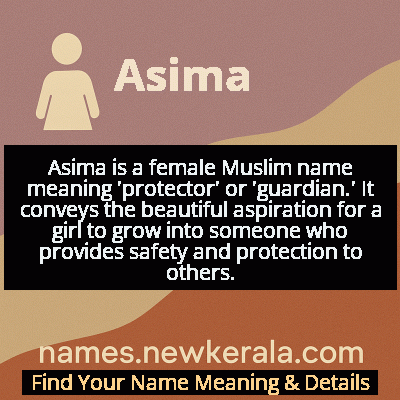Asima Name Meaning & Details
Origin, Popularity, Numerology Analysis & Name Meaning of Asima
Discover the origin, meaning, and cultural significance of the name ASIMA. Delve into its historical roots and explore the lasting impact it has had on communities and traditions.
Name
Asima
Gender
Female
Origin
Muslim
Lucky Number
7
Meaning of the Name - Asima
Asima is a female Muslim name meaning 'protector' or 'guardian.' It conveys the beautiful aspiration for a girl to grow into someone who provides safety and protection to others.
Asima - Complete Numerology Analysis
Your Numerology Number
Based on Pythagorean Numerology System
Ruling Planet
Neptune (Ketu)
Positive Nature
Intuitive, analytical, spiritual, and inquisitive.
Negative Traits
Secretive, reserved, aloof, and can be overly critical.
Lucky Colours
Green, yellow.
Lucky Days
Monday.
Lucky Stones
Cat’s eye, moonstone.
Harmony Numbers
1, 5, 6.
Best Suited Professions
Scientists, researchers, spiritual leaders, detectives.
What People Like About You
Depth of knowledge, analytical skills, spirituality.
Famous People Named Asima
Asima Chatterjee
Chemist
Pioneering work on medicinal plants and first woman to receive Doctorate of Science from an Indian university
Asima Halilović
Educator
Prominent advocate for women's education and intercultural understanding in Bosnia
Asima Sabanović
Researcher
Contributions to computer science and artificial intelligence research
Name Variations & International Equivalents
Click on blue names to explore their detailed meanings. Gray names with will be available soon.
Cultural & Historical Significance
The name's cultural resonance extends beyond mere semantics, connecting to broader Islamic concepts of amānah (trust) and the responsibility to protect what is entrusted to one's care. In contemporary Muslim societies, Asima continues to be chosen by parents who wish to honor traditional values while giving their daughters a name that signifies strength and protection. The name's enduring appeal lies in its ability to bridge traditional Islamic values with modern aspirations for female empowerment, making it a meaningful choice across generations and geographical boundaries within the Muslim world.
Extended Personality Analysis
Women named Asima typically exhibit personality traits centered around protection, responsibility, and nurturing care. They often demonstrate strong intuitive abilities regarding others' needs and possess a natural inclination to safeguard those around them. This protective nature manifests as remarkable loyalty and reliability, making Asimas the pillars of their social circles and families. They tend to be perceptive individuals who can sense when others are vulnerable or in need of support, and they respond with genuine compassion and practical assistance. Their protective instincts are balanced with wisdom, knowing when to step in and when to allow others their autonomy.
In professional and social settings, Asimas often gravitate toward roles where they can exercise their guardian qualities, such as teaching, healthcare, counseling, or leadership positions. They possess a quiet strength that emerges during challenging situations, demonstrating resilience and determination when protecting their principles or loved ones. While they may appear reserved in unfamiliar environments, their warmth and caring nature become evident in trusted relationships. Asimas typically value stability and security, both providing these qualities to others and seeking them in their own lives. Their combination of protective instinct, emotional intelligence, and practical wisdom makes them exceptional friends, partners, and community members who naturally earn the trust and respect of those around them.
Modern Usage & Popularity
In contemporary naming practices, Asima maintains a steady presence within Muslim communities worldwide, particularly appreciated for its meaningful connotations and cultural authenticity. While not ranking among the most popular names, it enjoys consistent usage across generations, often chosen by parents seeking traditional names with positive meanings. The name has seen modest resurgence in recent years as part of a broader trend toward reviving meaningful classical Arabic names. In Western countries with Muslim populations, Asima appeals to parents balancing cultural heritage with integration, as it is distinctive yet accessible to non-Arabic speakers. Its usage patterns show particular strength in educated, urban Muslim families who value both traditional meanings and modern applicability. The name's appeal lies in its combination of cultural depth, elegant pronunciation, and the empowering meaning of 'protector,' which resonates with contemporary values of female strength and independence while maintaining religious and cultural significance.
Symbolic & Spiritual Meanings
Symbolically, Asima represents the multifaceted concept of protection in both physical and metaphysical realms. The name serves as a living metaphor for sanctuary and safe harbor, embodying the idea of a person who provides emotional refuge and security to others. In Islamic symbolism, it connects to the notion of divine protection (ʿiṣmah) and the concept of being preserved from harm through faith and righteous living. The name also symbolizes the protective mantle traditionally associated with maternal figures and community guardians, representing the balance between strength and compassion. In a broader sense, Asima symbolizes the human capacity to create spaces of safety and trust in relationships and communities, serving as a reminder of our responsibility to protect the vulnerable and uphold justice. The symbolic resonance extends to representing inner fortitude and moral protection, suggesting someone who safeguards not only physical well-being but also ethical principles and spiritual values.

